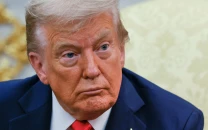Pakistan’s self-defeating Kashmir policy
It seems a majority of Muslims in Kashmir would favour independence rather than merger with either India or Pakistan.

Pakistan’s self-defeating Kashmir policy
It seems a majority of Muslims in Kashmir would favour independence rather than merger with either India or Pakistan. Pakistan’s implicit stance since 1947 has been that Kashmiris don’t want to be a part of India. It seems now they don’t want to be a part of Pakistan either. With Pakistan the state it is in, who would volunteer to become a Pakistani?
Also, had India allowed Kashmiris to govern their own lives, it might have presented Pakistan with a fait accompli by now. Instead, Kashmiris have been force-fed a steady diet of repression administered by India’s half a million troops stationed in the Valley. Since the start of the first Kashmir insurgency in 1989, some 40,000 civilians have been killed according to the Indian army itself; 100,000 according to the Kashmiri Hurriyat Conference. There have been thousands of cases of rape, torture and summary detention. The most recent uprising in the Kashmir valley has claimed the lives of over a hundred protesters, many of them teenagers. But what has Pakistan done to help the cause? It has consistently attempted to keep the Kashmir issue alive at the UN and other international forums, reminding the world that Kashmiris have never accepted India’s unilateral annexation. However, since 1989, the main plank in Pakistan’s Kashmir policy has been to train militants for infiltration into Indian occupied Kashmir. None other than the Great Commando has admitted this, the man who ruled Pakistan for nine years. Musharraf justified the policy as a logical response to India’s unwillingness to “discuss Kashmir at the UN and to resolve the dispute in a peaceful manner.” But has the policy of sponsoring jihad in Kashmir brought India closer to accepting a peaceable resolution of the dispute? History would suggest it has allowed India to do the exact opposite — divert international attention from genuine Kashmiri aspirations by labelling all acts of resistance as Pakistan-sponsored terrorism. After 9/11, the international community has little patience for the nuance between freedom fighter and terrorist.
Pakistan has a moral obligation to support the Kashmiri people even if they choose a future other than Pakistan. It should make this the declared crux of its Kashmir policy, rather than militancy or territorial ambition. By permanently abandoning all military options, conventional and otherwise, Pakistan will place itself on the unassailable moral high ground. It will also allow our state to divert resources towards internal development. An economically strong Pakistan that has gained the trust of the international community could do far more for the Kashmiri cause than a self-defeating jihad.
Published in The Express Tribune, November 22nd, 2010.



















COMMENTS
Comments are moderated and generally will be posted if they are on-topic and not abusive.
For more information, please see our Comments FAQ